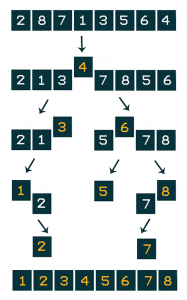The flowers presented to me on my Birthday. I adore roses.

Binary Blossoms Of The Curious Mind
The flowers presented to me on my Birthday. I adore roses.

Type: Divide and Conquer algorithm (Divide et Impera)
Created by: Sir Charles Antony Richard Hoare in 1962
Complexity:
Stability: not stable
Algorithm picks an element called pivot and rearranges the given array around the chosen pivot. Every manipulation is done within one array without creating any additional helping arrays.
The “Divide” part of the algorithm is achieved by a function called partition. Partition is a process of rearranging the initial array into two subarrays using the following logic:
Return value is an index of the pivot in the entire array between the two subarrays.
The “Conquer” part of the algorithm: sort the subarrays by a recursive calling of the quicksort.
Let’s say that we choose the last element of the array and its subbarrays as pivot (yellow color). By partitioning we can find the right place of the pivot in the array.
1.In the 1 iteration we have:
2.Call the quicksort on the subbarrays.

Efficiency of the quicksort depends on the choosing of the pivot.
Imagine, we have an already sorted array in the descending order and we choose the right element as pivot.
100 97 76 55 43 28 12
All elements are less than the pivot and there are no elements greater than the pivot. After calling the quicksort in the first iteration we will get:
97 76 55 43 28 12 100
The same will happen with all subbarrays.
97 76 55 43 28 12 100
76 55 43 28 12 97 100
In the above described case the array will be splitted n times and elements will be swapped n times which leads to the complexity of a worst-case running time \displaystyle O(n^2).
To make the above example better complexity, a pivot from the middle of the array should have been chosen. If a pivot is chosen ideally then after each recursive calling of the quicksort, an array will be splitted by \displaystyle O(log{n}) number of callings. Within each such recursive calling n elements will be swapped. That gives \displaystyle O({n}log{n}) complexity.
If we choose an improper pivot then an array will not be splitted and the problem will not be devided on subproblems. In this case we will just put pivot on its right place. For each calling of the quicksort we will need n operations to put pivot on its right place. That leads to \displaystyle O(n^2) complexity.
def quicksort(array, left, right):
if (left < right):
index = partition(array, left, right)
quicksort(array, left, index - 1)
quicksort(array, index + 1, right)
def partition(array, left, right):
pivot = array[right]
boundary = left - 1
for j in range(left, right):
if array[j] <= pivot:
boundary += 1
swap(array, boundary, j)
swap(array, boundary + 1, right)
return boundary + 1
def swap(array, i, j):
array[i], array[j] = array[j], array[i]
if __name__ == "__main__":
array = [2, 8, 7, 1, 3, 5, 6, 4]
quicksort(array, 0, len(array) - 1);
print(array)
def quicksort(array, left, right):
stack = list()
stack.append(left)
stack.append(right)
while (stack):
right = stack.pop()
left = stack.pop()
index = partition(array, left, right)
if (index - 1 > left):
stack.append(left)
stack.append(index - 1)
if (index + 1 < right):
stack.append(index + 1)
stack.append(right)
def partition(array, left, right):
pivot = array[right]
boundary = left - 1
for j in range(left, right):
if array[j] <= pivot:
boundary += 1
swap(array, boundary, j)
swap(array, boundary + 1, right)
return boundary + 1
def swap(array, i, j):
array[i], array[j] = array[j], array[i]
if __name__ == "__main__":
array = [8, 3, 6, 4, 1, 4, 2, 4, 150, 0, -1]
quicksort(array, 0, len(array) - 1);
print(array)